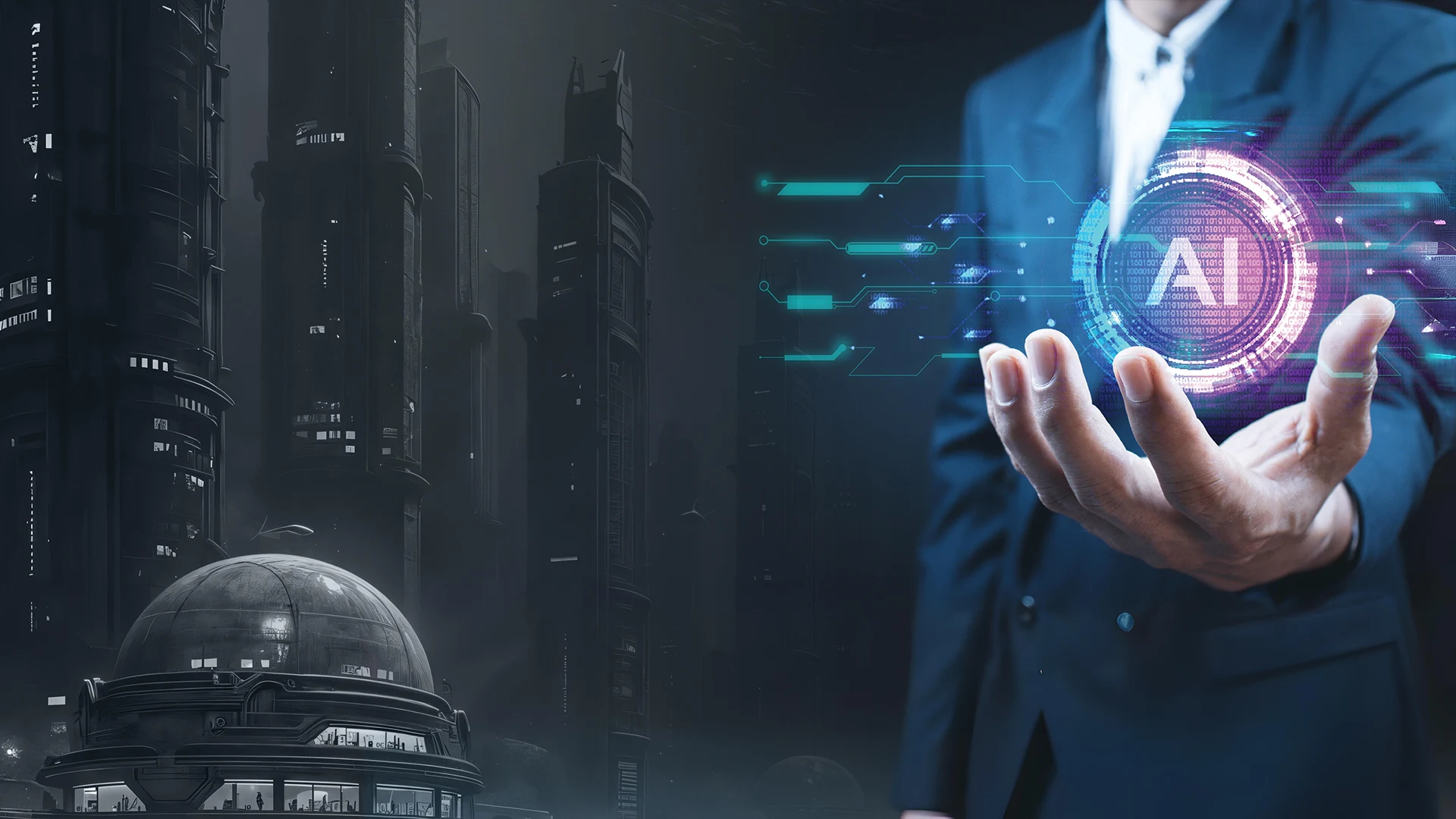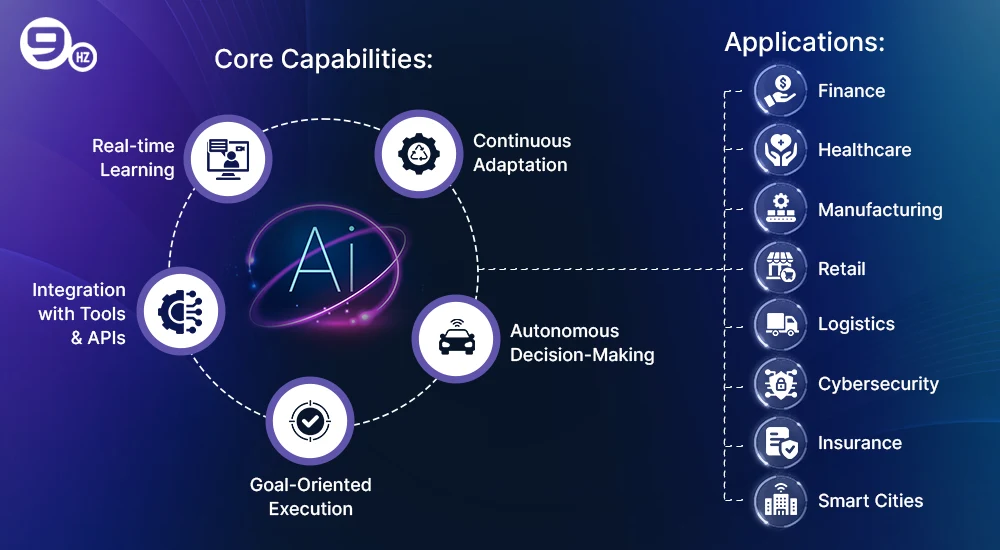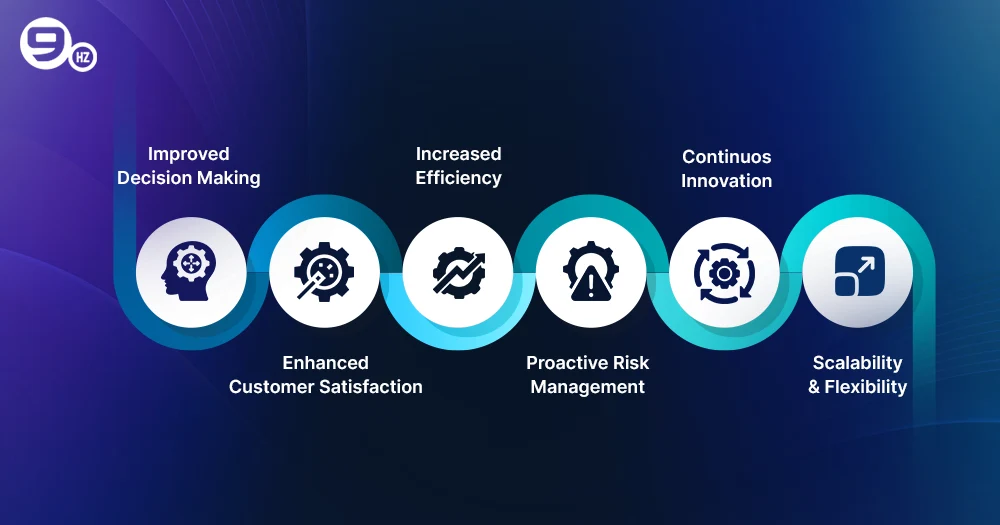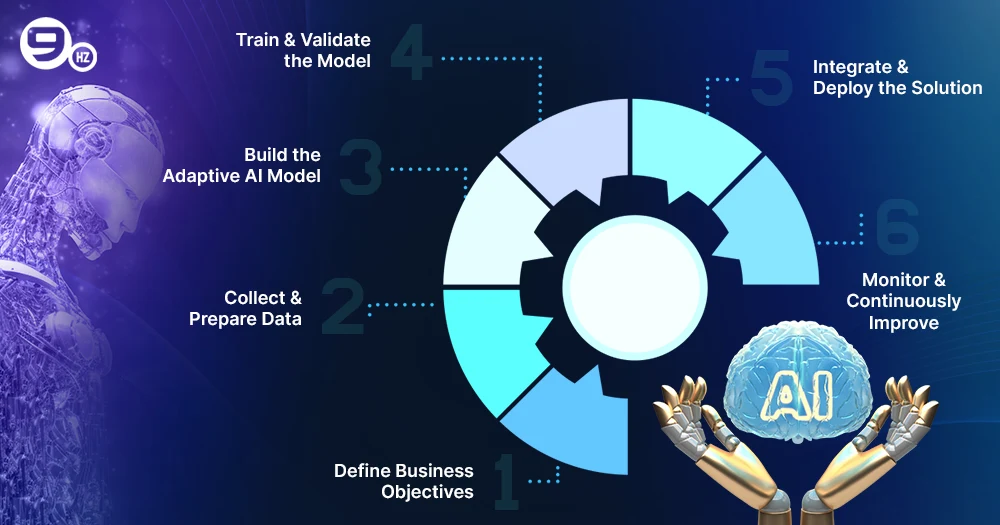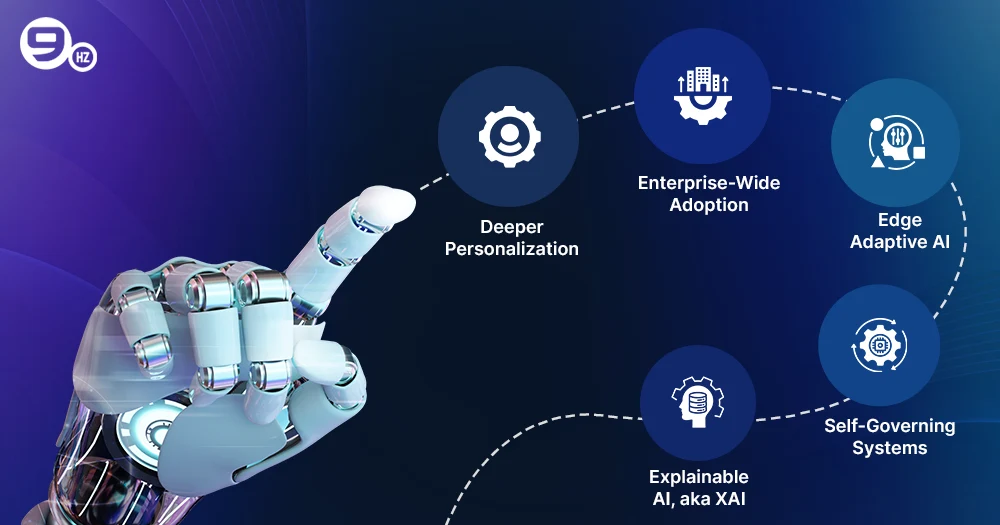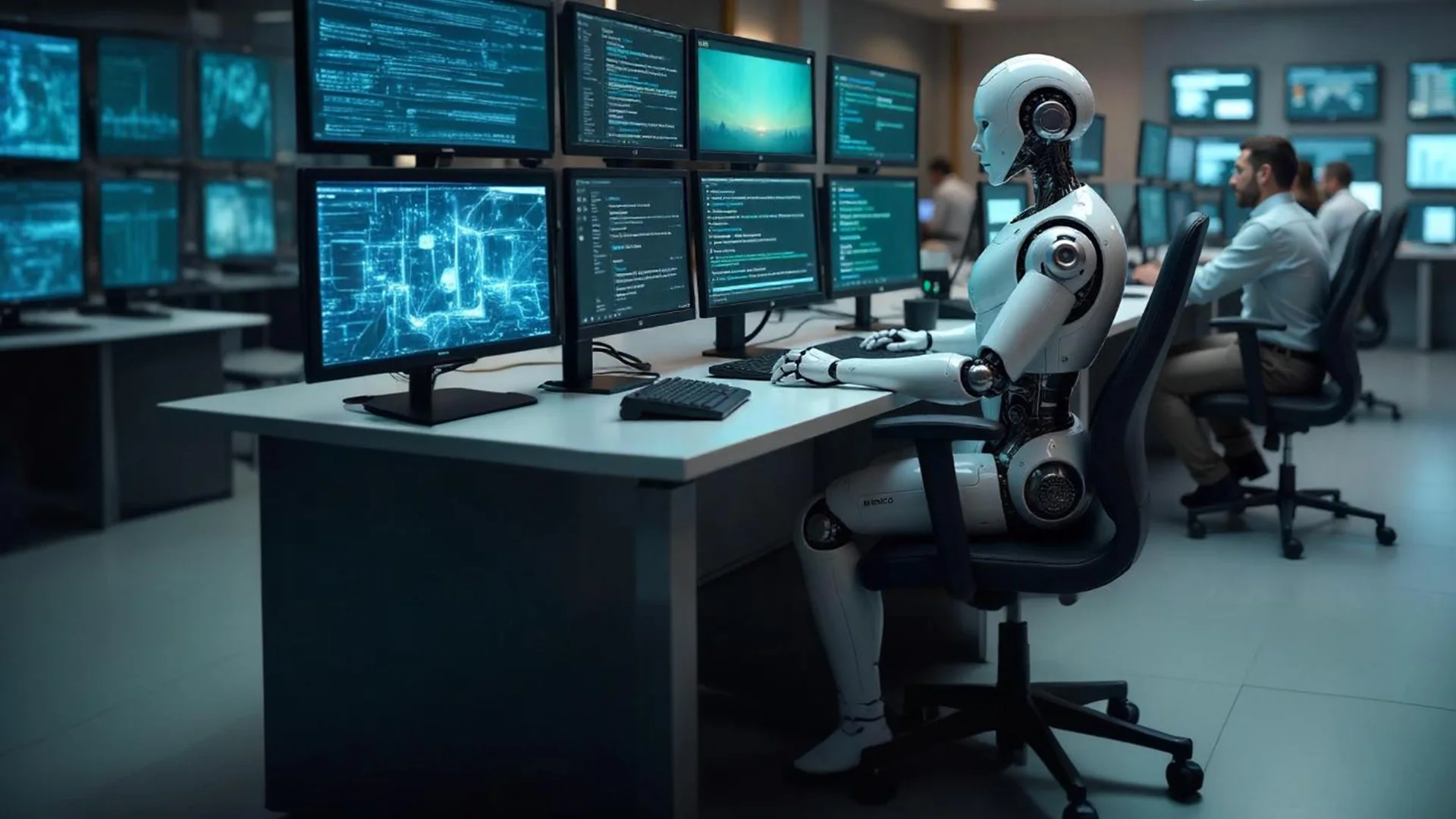What if you have a system at your manufacturing plant that predicts and prevents breakdowns without making any alerts? Or what if an OTT app suggests TV shows based on users’ tastes?
Yes, that is true and happening, and the science behind this is ” Adaptive AI”!
Adaptive AI development is trending and offers more than conventional AI software or systems. It makes machines more intelligent and responsive. The best part is that it has applications across all industries, and its real-life use cases can leave you in awe.
In the current year, businesses plan to adopt AI in their practices on a massive scale. Adaptive artificial intelligence is something they can’t ignore due to its benefits.
Research shows that the global Adaptive AI market will surpass USD 1,607.0 million by 2030 at a CAGR of 2.8% from 2025 to 2030. The USA and South Korea dominate the market. The BFSI(Banking, Financial Services, and Insurance) sector has become a major user. These facts show how adaptive AI implementation will reshape the industries in the upcoming years.
Considering its importance and following the trends, we’ve created a guide on leveraging adaptive AI for business. This guide will walk you through all the crucial aspects and answer all your questions.
Wait a second. Are you also confused about when AI is present? Then what is this adaptive thing?
Let’s start with some basics!
What Does Adaptive AI Mean?
Although adaptive AI is a subset of Artificial Intelligence technology, it is different from conventional ones as it can learn, evolve, adapt, and respond on its own and without any human intervention. Instead of learning from a pre-defined set of rules, it learns through its experiences, adjusting its code and decision-making logic.
Let’s understand it through an example!
Imagine you have an eCommerce store that sells all types of apparel, from swimwear to party suits. Here, you must set the rules for a traditional AI recommendation system. Suppose someone searches for swimwear; the suggestions will be like t-shirts and shorts.
If someone searches for a sweatshirt, they must have recommendations for caps, mufflers, gloves, and woolen socks. You need to set the rules manually every time.
Instead of it, an Adaptive AI solution for eCommerce will learn through user search queries, clicks, and sales patterns. For example, there is a more search pattern on Linen Pants by the customers who also search for summer products. In that case, it automatically recommends summer clothing without anyone rewriting the rules.
The definition says, “Adaptive AI is the subset of AI that learns dynamically and adjusts its behavior by analyzing chunks of user-generated data.”
You might be interested in: Adaptive AI vs Generative AI: Key Differences
5 Key Characteristics of Adaptive AI Include
What makes AI adaptive are its characteristics. Adaptive AI core characteristics distinguish it from conventional AI, which involves:
1. Adaptability
Self-adaptability is a key characteristic of adaptive AI. Custom adaptive AI solutions adjust their algorithms and decision-making processes based on data, environment, or operational context.
2. Continuous Learning
Adaptive AI systems can process patterns and information, gain knowledge, and acquire information without manual effort. Machine learning empowers these systems to learn continuously from actions and interactions.
3. Self-improvement Architecture
Apative AI systems analyze their performance and improve their capabilities by refining their algorithm, which leads to uninterrupted improvement over time.
4. Context-Aware Intelligence
It focuses on what, why, where, and how. Adaptive AI works on the basis of context-aware intelligence, which separates it from traditional AI.
5. Problem-Solving Capability
With core characteristics like adaptability, continuous learning, self-improvement, and context-aware intelligence, Adaptive AI utilizes problem-solving capability to make informed decisions.
How Adaptive AI Is Transforming Different Industries?
Adaptive AI is useful in any industry that needs new ideas. Let’s have a look into some real-world adaptive AI use cases to see how it’s being applied in practice.
- Healthcare: Adaptive artificial intelligence can help with personalized treatment, medical image analysis, faster drug discovery, and more.
- Finance: Adaptive AI development is a promising technology for fintech. It can be utilized for fraud detection, credit scoring, algorithmic trading, market analysis, etc.
- Manufacturing: Adaptive intelligence systems help optimize supply chains, detect equipment failure, and control quality, making them perfect for the manufacturing industry.
- Retail: It has use cases in e-commerce and retail, such as personalized recommendations, dynamic pricing, inventory optimization, in-store robotics, and advanced strategizing.
- Transportation: Custom adaptive AI solutions help implement autonomous vehicle mechanisms, traffic management, predictive maintenance, and more.
- Customer Service: Adaptive AI solutions for customer services learns through interactions and dynamically adjust themselves to provide personalized support.
Adaptive AI also has applications in Agriculture, Education, Cybersecurity, and the Marketing industry.
6 Benefits of Adaptive AI Implementation in Your Business
Businesses face complex challenges and competition in this competitive world where user preferences change overnight. Here, they need a technology that can effectively help them achieve their goals and competitive edge. Regarding this, adaptive AI solution development is perfect and offers benefits such as:
1. Improved Decision Making
Adaptive AI can analyze a vast amount of data and information seamlessly. This allows organizations to make smarter decisions by utilizing adaptive intelligent systems.
2. Enhanced Customer Satisfaction
One of the significant benefits of Adaptive AI implementation is personalized customer satisfaction. Analyzing sales trends, purchase history, and user preferences, Adaptive AI systems provide tailored recommendations by adjusting the rules.
3. Increased Efficiency
You don’t need to rely on resources, as Adaptive AI can handle repetitive tasks such as data entry, customer service, invoice processing, etc.
4. Proactive Risk Management
Adaptive AI systems can sense and respond in real time to threats before they occur. These systems collect, analyze, and process data to minimize risks at a higher level.
5. Continuous Innovation
Due to key characteristics like continuous learning and adaptability, adaptive artificial intelligence helps businesses respond quickly to market needs and launch innovative solutions.
6. Scalability & Flexibility
With growing business needs, Adaptive AI systems automatically scale without requiring human efforts, making them perfect for any industry.
How to Develop an Adaptive AI Solution? (Step-by-step Process)
Driving the best results with Adaptive AI and effectively using it for your business depends on how you implement it. Here are the steps to develop a custom Adaptive AI solution.
1. Define Business Objectives
The first step is to define the system’s objectives and use cases. It will lay the foundation for a solution. So, here you need to find out what paint points the solution will solve? What accuracy and adaptability rate do you need? And who is your target audience? Create a clear documentation stating all your goals.
2. Collect & Prepare Data
Adaptive AI systems work on datasets; you need well-maintained and cleaned data here. Therefore, collect relevant data aligned with your system’s objective, preprocess and clean it with the help of experts to remove redundancies, inconsistencies, and noise to ensure accuracy and effectiveness.
3. Build the Adaptive AI Model
The proper machine learning techniques and model architecture are essential for developing a next-gen AI solution. The most popular or widely used techniques are reinforcement, neural networks, deep learning, meta-learning, and active learning.
4. Train & Validate the Model
Train the model using labeled datasets and algorithms to recognize patterns. To ensure the model’s robustness, use cross-validation techniques and hyperparameter tuning to optimize performance. Finally, test your model to identify areas for improvement and tune its accuracy.
5. Integrate & Deploy the Solution
Now, integrate the trained model and ensure its compatibility with your existing systems, such as CRM, ERP, marketing automation platform, or application environment. The best practice for deploying the model is deploying it in a scalable and distributed manner so it can seamlessly handle workflows and boost future growth.
6. Monitor & Continuously Improve
Consistent monitoring and maintenance are required to ensure the success of any solution, and the same applies to Adaptive AI solutions. Implement a robust monitoring mechanism to evaluate the system’s performance based on key metrics such as accuracy, adaptability, and resource utilization. Regularly update the model with accurate and new data sets to drive the best results.
Adaptive AI vs Traditional AI
While reaching this section of this blog, some readers might still wonder what the difference between traditional AI and adaptive AI is.
Let’s simplify it!
| Feature | Traditional AI | Adaptive AI |
|---|---|---|
| Learning | Learns and operates on a fixed set of rules, uses static data for training | Learns continuously and autonomously, adjusting their own set of rules |
| Problem Solving | Rigid in nature, can’t solve new problems without training | Adjust strategies dynamically, sensing the situations to solve the problems |
| Data & Environment | Requires a specific data set and a predictable environment | Can process evolving data and works seamlessly in an unpredictable environment |
| Risk Mitigation | Lags in analyzing the risks or identifying the risks based on training data | Provides proactive risk management features and senses the risks before they happen |
| Use Cases | Suitable when requirements are fixed | It works tremendously where needs are dynamic, such as in fraud detection in BFSI or demand forecasting in supply chains. |
Although both are best at their place, due to rising, fierce market competition, Adaptive AI development offerings are innovative and can help you achieve something bigger with an extra edge in the market.
6 Challenges in Adaptive AI Implementation
Now, let’s talk about the darker side. What? Are you surprised?
Yes, there are some challenges associated with adaptive AI implementation, similar to other technologies. Here are these:
1. Data Quality & Availability
Data is a fuel for custom adaptive AI solutions, and the concept is simple: refined and cleaned data will produce refined results. The challenge is to have data that is cleaned, unbiased, and regularly updated.
Solution- Regular data audit, robust data management and governance policy, scalable infra to access real-time and accurate data.
2. Reliability
Adaptive AI systems are autonomous and can adjust or refine their algorithms. So, basically, sometimes, these systems turn into Black Boxes. There is no explanation why they made a specific decision and how. This may lead to serious issues, especially when we’re using them for healthcare or law.
Solution– Use transparent and explainable AI frameworks, a system that logs decisions, and educate stakeholders about its limitations.
3. Integration Complexity
Adopting adaptive AI development is the smart move, but does your system support it? Integration with legacy systems is often the biggest challenge, especially for organizations that have relied on them over the years.
Solution– Develop a pilot project, phased adaptive AI implementation, utilize modern APIs and middleware solutions.
4. Ethical & Regulatory Challenges
The autonomous and self-improving nature of adaptive AI also raises significant ethical questions. If AI makes a mistake, who is responsible? What is the impact on jobs or human resources who have worked for an organization over the years? How does it ensure that an adaptive AI system is complying with regulations accurately?
Solution: Create an ethical framework, regularly monitor it under compliance experts, and involve a multidisciplinary team to govern human values.
5. Security Challenges
Adaptive AI systems are also vulnerable to security breaches and data attacks, as nothing is perfect in this world. Things can be disastrous if someone feeds the system malicious data. This is one potential challenge that can’t be ignored.
Solution– Implement robust security and encryption protocols, ensure high-end privacy, and continuously update the system and its security features with the help of adaptive AI solution development experts.
6. Skill Shortage
Although adaptive AI can handle things by itself and doesn’t need human intervention, that is one side of the story. To handle these systems, you need multidisciplinary teams, such as those in data science, machine learning, AI development, and others. For some businesses, this can be a challenge.
Solution: Invest in training your human resources and upskill them, eliminating the myth that AI will replace them.
How Much Will it Cost to Develop Adaptive AI Solution?
You’re probably wondering how much Adaptive AI development costs. Typically, it ranges from $40,000 to $150,000 or more, depending on your requirements. Myriad factors influence development costs, such as complexity, data models, features, and more.
So, here is a ballpark estimate for solutions with different complexity levels.
| Project Complexity | Estimated Cost (USD) |
|---|---|
| Simple | $40,000-$60,000 |
| Medium | $60,000-$80,000 |
| Complex | $80,000 onwards |
| Custom Adaptive AI Solutions for Enterprise | $100,000-$200,000 |
These are just rough estimates. To estimate the cost accurately, it would be best to consult with a reputed Adaptive AI development company.
How to Choose the Right Adaptive AI Development Company?
For Adaptive AI implementation, it is important to know who will develop it for you. So, these steps will help you choose the right development partner:
1. Define Your Goals
Before you make any decision, the first step is to define your goal. You must know what challenge you want to solve with Adaptive AI, such as streamlined customer services, a personalized banking assistant, or a predictive maintenance system.
2. Find a Tech Partner
The next step is to find the right technology partner with appropriate experience in developing custom adaptive AI solutions. So, start searching the Internet, review their work portfolio and testimonials, and shortlist them.
3. Check The Skills
Once you have shortlisted the companies, the next step is to check the technical skills of their AI development team. Here you need to enquire:
- What kind of experience do they have in adaptive AI solution development?
- What types of projects have they developed and delivered?
- What tech stack do they use?
- For whom have they worked, and how do they solve their pain points?
- What kind of security mechanism do they follow?
- Are they open to transparent communication?
4. Hire Adaptive AI Developers
After getting satisfactory answers to all questions, enquire about the engagement model so you can hire developers at your convenience. Once the hiring model is okay with your needs, hire developers and start your project.
So, what is the checklist while selecting an adaptive AI development partner?
These criteria are:
- Industry Experience
- Technical Expertise
- Communication and soft skills
- Innovative Mindset
- Transparency
- Flexibility of engagement models
- Client Satisfaction
This will lead you to the right solution partner who can develop an adaptive AI system for your industry, meeting all your needs and industry standards.
Future Trends in Adaptive AI Development
Adaptive AI is built to make Artificial Intelligence solutions more independent and aimed to solve real-world challenges that don’t require any intervention. So, here are some future trends for Adaptive AI development:
1. Deeper Personalization
In the near future, applications will use adaptive AI to provide hyper-personalized user experiences where conventional AI lags.
2. Enterprise-Wide Adoption
Right now, the technology has limited use cases, but its offerings are limitless across industries. Thus, very soon, we’ll witness Adaptive AI adoption at the enterprise level, helping businesses make context-aware decisions.
3. Edge Adaptive AI
This refers to integrating and implementing AI directly on the device, which allows faster decisions without the need to send the data to the cloud.
4. Self-Governing Systems
In the coming years, we’ll witness self-governing systems that can autonomously detect errors, make their own decisions, and restore performance. This will improve productivity and reduce the associated monitoring costs.
5. Explainable AI, aka XAI
Still, some ethical and legal concerns are associated with XAI, but in the future, XAI will solve this problem and rise as an extended arm of Adaptive AI. The business will have a clear view of the decisions that will be made by its AI-powered systems.
These trends will completely reshape industries, where AI will be a supporting arm for sustainable growth and will become the foundation for next-gen solutions for key industries such as supply chain, manufacturing, finance, healthcare, and more.
How The NineHertz Can Assist in Adaptive AI Development?
As a leading provider of artificial intelligence development services to global industries, The NineHertz specializes in providing Industry 4.0 solutions that simplify challenges. We help businesses with a wide range of solutions, from personalization to implementing AI agents that can handle tasks.
Our expertise spans diverse industries, and we’ve achieved this by utilizing our full potential and resources. Over the years, we have consistently delivered cost-effective AI solutions by pinpointing opportunities to add value to the project. This makes us your go-to partner for Adaptive AI development.
Conclusion
Adaptive AI has great potential to transform business practices. It can help enterprises become more independent, customer-centric, and efficient by leveraging self-governed solutions. Custom adaptive AI solutions empower businesses to scale, ensuring they achieve their goals while delivering complete customer satisfaction and cost efficiency.
Adaptive artificial intelligence offers a multitude of self-improving and evolving solutions that adapt to your industry, business, and customers’ needs. The only thing you need to do is hit the bullseye with a custom solution built with the help of experts. NineHertz, an experienced AI development company, is here to assist you with that.
So, when are you planning to adopt Adaptive AI? The time is now, and we’re ready to assist you. Let’s Talk!
Frequently Asked Questions (FAQs)
What is Adaptive AI Development Mean?
Adaptive AI development refers to developing smart systems or applications that can learn and make their own decisions. These applications can adjust their algorithm through sensing data and real-time conditions.
How is Adaptive AI Used in Business?
In business, adaptive AI is used to make things more efficient and to help companies react quickly to changes. For example, a business can use it to create a more personal experience for customers online. Other examples are fraud detection, predictive maintenance of equipment, inventory automation, and others.
What Industries Benefit Most from Adaptive AI?
Almost all industries, such as finance, healthcare, retail, manufacturing, and others, can leverage adaptive AI because of its characteristics, such as continuous learning, adaptability, self-improvement, and autonomous problem solving.
Great Together!
